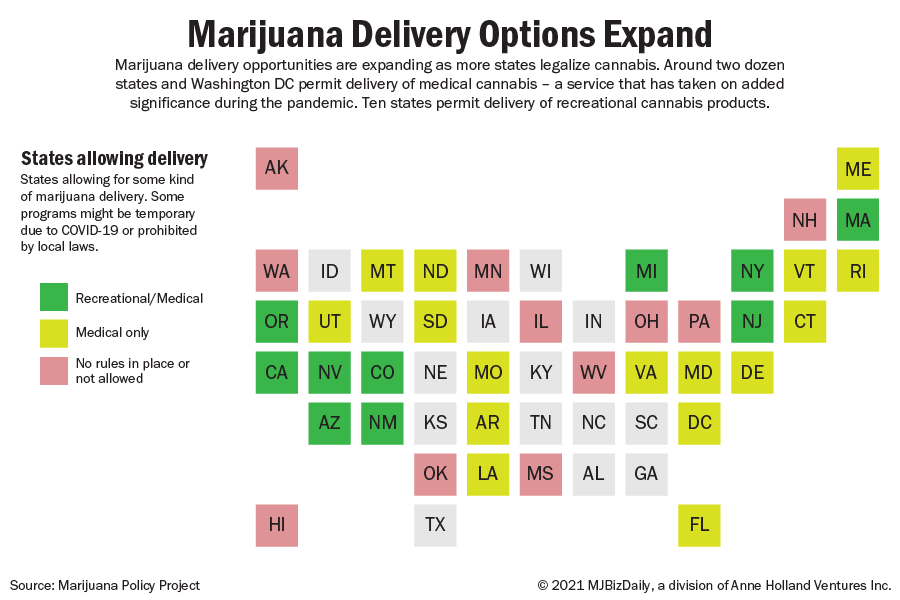After several months of smaller, more focused transactions, Florida-based Trulieve’s $2.1 billion deal to acquire Harvest Health & Recreation could mark a resurgence in cannabis megamergers, industry experts say.
Big mergers and acquisitions generally have been on hiatus for the past year or so amid the coronavirus pandemic, falling cannabis stock prices and close antitrust scrutiny from the U.S. Department of Justice during the Trump administration.
But all of that might be changing under the new Biden administration amid signs the fragmented marijuana industry is again riding a consolidation wave.
“We’ve been talking quite a bit about M&A as a long game,” said Morgan Paxhia, managing director of San Francisco-based Poseidon Asset Management.
“With the state-to-state challenge, it just makes sense for operators trying to get scale and significant market share, and this is a path to do it.”
If Monday’s Trulieve-Harvest deal closes as expected, the combined marijuana company will operate in 11 states, with a total of 22 growing and processing facilities and 126 medical and recreational cannabis dispensaries stretching across the Southeast, Northeast and Western United States.
The merger provides Trulieve – which is dominant in Florida’s gigantic MMJ industry – entry into Arizona, where Harvest is the market leader in medical and adult-use marijuana.
However, the combined entity also will have gaps: Neither Trulieve nor Harvest has a presence in Illinois, New Jersey or New York.
Illinois has become a hot adult-use market, and recreational marijuana is on the way in New Jersey and New York after recent legalization.
Some experts questioned Trulieve’s strategy, noting that the company had perhaps less expensive options to enter markets or expand operations.
Are megamergers back?
New York-based Viridian Capital Advisors reported last week that it has tracked 98 M&A transactions year-to-date, compared with 26 for the same period a year ago. So the activity overall is hot.
But the deals have been smaller, more focused and strategic in nature, compared with the $500 million-plus mergers announced in 2019.
Some of those – including an $850 million deal between Harvest and Chicago-based Verano Holdings – collapsed for a variety of reasons, including declining stock prices and lengthy federal antitrust reviews by then-U.S. Attorney General William Barr’s Justice Department.
Some characterized Barr’s approach as harassment of the cannabis industry.
This could be the first test under President Biden’s administration to see if the Justice Department undertakes similarly expensive and painstaking antitrust reviews under what is called the Hart-Scott-Rodino Act (HSR).
“If this (Trulieve-Harvest) deal closes and there’s no regulatory holdback, then I think this will accelerate the larger deals that really did cool off,” Paxhia said.
“I think this does open the door.”
Andrew Partheniou, an analyst with St. Louis-based investment banking firm Stifel, expects a more expedited review, with the deal closing in the third or fourth quarter of this year.
“We believe the (Trulieve-Harvest) deal will close as is, with trends pointing to lower risk of lengthy delays,” Partheniou wrote in a research note Monday.
Positive signs, he noted, include a change in presidential administrations and the fact that new U.S. Attorney General Merrick Garland signaled the cannabis industry would be a low enforcement priority.
In another positive development, Cresco Labs recently reported that the Justice Department’s antitrust division didn’t make a second request for information in the Illinois-based company’s proposed acquisition of a Massachusetts cultivator.
In addition, Partheniou noted, the Trulieve-Harvest deal has only two significant overlapping state markets: Florida and Pennsylvania.
While Trulieve holds a roughly 45% market share in Florida, Harvest’s estimated market share there is only 1%-2%, Partheniou wrote.
In Pennsylvania, the combined entities have less than 10% of the retail market share, he estimated.
‘Twitter sphere’ chatter
Paxhia said he had “started hearing chatter last week in the Twitter sphere” about a Trulieve deal to add depth in more marijuana markets.
In addition to Harvest, Paxhia said that another rumored target was Massachusetts-based Ascend Wellness, which has operations in Illinois, Massachusetts, Michigan, New Jersey and Ohio.
Paxhia acknowledged that he was surprised that Trulieve chose Harvest.
The deal, he said, might be more dilutive to Trulieve shareholders than some of the other options.
Perhaps reflecting that investor sentiment, Trulieve shares declined by roughly 5% on the merger news Monday, while Harvest’s stock shot up 12%.
Mike Regan, founder and analyst of Denver-based MJResearchCo, said the deal addresses criticisms that Trulieve was primarily a single-state operator in the medical marijuana-only market of Florida and that Harvest had too much debt.
Still, that Harvest debt must be managed, and Regan pointed out that risks remain in terms of integrating assets and teams, which always can be a challenge in merger deals.
Pablo Zuanic, an analyst for New York-based investment banking firm Cantor Fitzgerald, wrote in a research note Monday that Trulieve could have used a different and less expensive approach, such as buying more stores in Arizona, Maryland and Pennsylvania and rebranding them.
But “we realize that would have been (a) more painstaking approach with higher execution risk.”
“Even though Harvest would not have been our first choice,” Zuanic wrote, “we recognize that with this deal, Trulieve is now the number one player in Arizona, a close number one in Pennsylvania and expands its Florida presence.”
He added that “we realize there is a value in the Harvest expertise, retail banner and track record from being a fully-fledged operation.”
However, the Harvest deal doesn’t provide Trulieve an entry point into many other desirable markets in the East and Midwest, such as the relatively new and the soon-to-come adult-use marijuana states of Illinois, Michigan, New Jersey and New York.
“We assume the company will later on find other ways to enter key states like New York and New Jersey,” Zuanic wrote.
Jeff Smith can be reached at jeff.smith@mjbizdaily.com.





